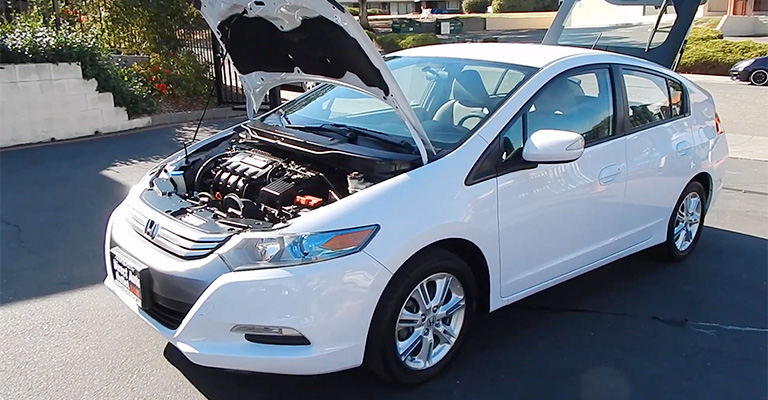The 2010 Honda Insight was a hybrid electric vehicle produced by the Japanese automaker Honda. It was the second generation of Honda’s Insight model and was available as a hatchback.
While the 2010 Honda Insight received praise for its fuel efficiency and low emissions, it was not without its problems.Some common issues that have been reported by 2010 Honda Insight owners include transmission problems, faulty hybrid system components,
and problems with the electrical system. In this article, we will discuss some of the common problems that have been reported with the 2010 Honda Insight and provide information on how to address these issues.
It is important to note that while the 2010 Honda Insight may have some problems, it is not necessarily a “lemon” and may provide reliable transportation for many drivers.

2010 Honda Insight Problems
1. Ntegrated Motor Assist (IMA) battery failure
The IMA battery is a type of hybrid battery that is used in Honda’s hybrid vehicles to store electrical energy that is generated by the hybrid system. Some 2010 Honda Insight owners
have reported issues with the IMA battery, including failure or a reduced ability to hold a charge. This can result in reduced fuel efficiency and performance, as well as other problems with the hybrid system.
2. Shudder from continuously variable transmission (CVT)
The 2010 Honda Insight is equipped with a CVT, which is a type of automatic transmission that uses a belt or chain to continuously vary the gear ratio. Some owners have reported experiencing a shudder or judder when driving the 2010 Honda Insight,
which is typically caused by a problem with the transmission. This issue can be difficult to diagnose and may require the assistance of a mechanic or Honda dealer to resolve.
3. Software update for IMA computer
The IMA computer is a key component of the hybrid system in the 2010 Honda Insight, and it is responsible for managing and controlling the operation of the hybrid system.
Some owners have reported issues with the IMA computer and have needed to have a software update performed in order to resolve these issues. This update may be necessary to address problems with the hybrid system or to improve the overall performance of the vehicle.
Possible Solution
| Problem | Description | Possible Solution |
| IMA battery failure | The IMA battery is not holding a charge or has failed completely. | Replace the IMA battery or have it repaired. |
| Shudder from CVT transmission | The vehicle experiences a shudder or judder when driving. | Have the transmission inspected and repaired by a mechanic or Honda dealer. |
| Software update for IMA computer | The vehicle’s hybrid system is not functioning properly or the performance is reduced. | Have the IMA computer software updated by a mechanic or Honda dealer. |
| Electrical system problems | The vehicle is experiencing issues with the electrical system, such as problems with the battery or charging system. | Have the electrical system inspected and repaired by a mechanic or Honda dealer. |
| Hybrid system problems | The vehicle is experiencing issues with the hybrid system, such as reduced fuel efficiency or performance. | Have the hybrid system inspected and repaired by a mechanic or Honda dealer. |
2010 Honda Insight Recalls
| Recall Number | Description | Models Affected |
| 19V500000 | Newly Replaced Driver’s Air Bag Inflator Ruptures During Deployment Spraying Metal Fragments | 10 models |
| 19V502000 | Newly Replaced Passenger Air Bag Inflator Ruptures During Deployment Spraying Metal Fragments | 10 models |
| 19V378000 | Replacement Passenger Frontal Air Bag Inflator Improperly Installed During Previous Recall | 10 models |
| 18V661000 | Passenger Air Bag Inflator Ruptures During Deployment Spraying Metal Fragments | 9 models |
| 18V268000 | Front Passenger Air Bag Inflator Potentially Installed Improperly During Replacement | 10 models |
| 18V042000 | Passenger Air Bag Inflator Ruptures During Deployment Spraying Metal Fragments | 9 models |
| 17V545000 | Replacement Air Bag Inflator For Previous Recall May Have Been Improperly Installed | 8 models |
| 17V030000 | Passenger Air Bag Inflator Ruptures During Deployment Spraying Metal Fragments | 9 models |
| 16V346000 | Passenger Frontal Air Bag Inflator Ruptures On Deployment | 9 models |
| 16V061000 | Driver’s Frontal Air Bag Inflator Ruptures And Sprays Metal Fragments | 10 models |
19V500000:
This recall is due to the newly replaced driver’s air bag inflator rupturing during deployment, which can spray metal fragments. This can result in serious injury or death to the driver or other occupants.
19V502000:
This recall is due to the newly replaced passenger air bag inflator rupturing during deployment, which can spray metal fragments. This can result in serious injury or death to the driver or other occupants.
19V378000:
This recall is due to the replacement passenger frontal air bag inflator being improperly installed during a previous recall. An incorrectly installed air bag inflator may not properly deploy the passenger frontal air bag in the event of a crash, increasing the risk of injury.
18V661000:
This recall is due to the passenger air bag inflator rupturing during deployment, which can spray metal fragments. This can result in serious injury or death to the driver or other occupants.
18V268000:
This recall is due to the front passenger air bag inflator potentially being installed improperly during replacement. An incorrectly installed air bag may deploy improperly in the event of a crash, increasing the risk of injury.
18V042000:
This recall is due to the passenger air bag inflator rupturing during deployment, which can spray metal fragments. This can result in serious injury or death to the driver or other occupants.
17V545000:
This recall is due to the replacement air bag inflator for a previous recall potentially being improperly installed. In the event of a crash, an incorrectly installed passenger frontal air bag inflator may deploy the air bag improperly, increasing the risk of injury.
17V030000:
This recall is due to the passenger air bag inflator rupturing during deployment, which can spray metal fragments. This can result in serious injury or death to the driver or other occupants.
16V346000:
This recall is due to the passenger frontal air bag inflator rupturing on deployment. This can result in serious injury or death to the vehicle occupants.
16V061000:
This recall is due to the driver’s frontal air bag inflator rupturing and spraying metal fragments. In the event of a crash necessitating deployment of the driver’s frontal air bag, the inflator could rupture with metal fragments striking the driver or other occupants, resulting in serious injury or death.
Problems and Complaints Sources
https://repairpal.com/2010-honda-insight/problems
https://www.carcomplaints.com/Honda/Insight/2010/
All Honda Insight years we talked –




